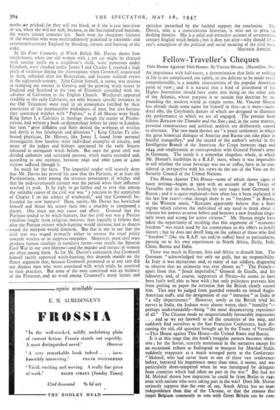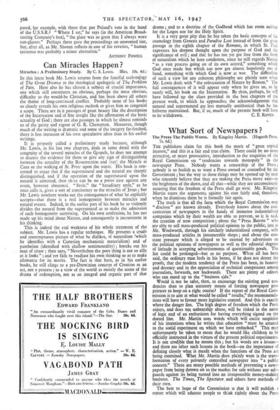Fellow-Traveller's Cheques
This House Against This House. By Vincent Sheean. (Macmillan. 16s.; AN impatience with half-tones; a determination that little or nothing in life is too complicated, too subtle, or too delicate to be made easily comprehensible, is a notable characteristic of the popular American point of view ; and it is natural that a kind of priesthood of the Higher Journalism should have come into being on the other side of the Atlantic, whose purpose is to sustain that doctrine by ex- pounding the modern world in simple terms. Mr. Vincent Sheean has already made some name for himself in this—as it were—sacer- dotal role, the Corybantic dances of which are designed to illustrate the performance in which we are all engaged. The present book follows Between the Thunder and the Sun ; and, in the same manner, personal reminiscence and political analysis are deliberately caused to alternate. The two main themes are " a peace settlement in which the great historical dialogue of America and Russia can take place in fruitful tranquillity," and the record of the author's service in the Intelligence Branch of the American Air Corps between 1942 and 1944, and employment as correspondent with General Patton's army in Germany. The result is a somewhat shapeless whole, in which Mr. Sheean's hardships in a R.A.F. mess, where it was impossible to tell whether the issue beverage was tea or coffee, have to be con- sidered in perspective with his views on the use of the Veto on the Security Council of the United Nations.
This House Against This House—some of which shows signs of hasty writing—begins in 1919 with an account of the Treaty of Versailles and its makers, leading by easy stages from Germany to Russia ; and it is again explained—how often has it been explained in the last few years!—that though there is no " freedom " in Russia, in the Western sense, "Russians apparently believe that a State regime which relieves the individual of any need to think about it releases his powers as never before and bestows a new freedom singu- larly sweet and strong for active citizens." Mr. Sheean might have taken the opportunity of recalling that this argument of " economic freedom " was much used by his countrymen in the 186o's to justify slavery ; but he does not dwell long on the subject of those who find " freedom " (like the R.A.F. tea and/or coffee) hard to particularise, passing on to his own experiences in North Africa, Sicily, Italy, China, Burma and India.
There was much in Europe, Asia and Africa to disturb him. The Germans " acknowledged not only no guilt, but no responsibility. In Italy it was mysterious and, to many of our soldiers, disgusting to observe that no animosity was ever shown us." The French— apart from that " Jesuit imperialist;" General de Gaulle, and his followers, and, of course, supporters of Petain—he seems to have been fairly well_able to bear with ; but only politeness prevents him from putting on paper the irritation that the British clearly caused him. This may be judged from guarded remarks on mixed Anglo- American staffs, and the designation of our "intrusion" in India as "a silly impertinence." However, sorely as the British tried his nerves in India, the Indians were almost worse, their " humility "- perhaps understandably—being " the most disconcerting experience of all." The Chinese made an unquestionably favourable impression . . . and so we say farewell to all the countries of the map, and suddenly find ourselves at the San Francisco Conference, back dis- cussing the old, old question brought up by the Treaty of Versailles —This House against This House—the United States and Russia.
It is at this stage that the book'S irregular pattern becomes obtru- sive ; for the Soviet, scarcely mentioned in the narrative except for an occasional tribute to Stalingrad or bouquet for Marshal Stalin, suddenly reappears as a much wronged party at the Conference. "Molotof, who had never been to one of these vast conferences before, betrayed his impatience more than once, it seems, and was particularly short-tempered when he was harangued by delegates from countries which had taken no part in the war." But had not M. Molotof shown how impatient he could be from Berlin in 194o even with nations who were taking part in the war? Does Mr. Sheean seriously suppose that the vote of, say, South Africa has no more independence than- that of the Ukraine, or that the 'reasons that impel Belgium commonly to vote with Great Britain can be corn-
pared, for example, with those that put Poland's vote in the hand of the U.S.S.R.? " Where I sat," he says (in the American Broad- casting Company's box), " the glare was so great that I always wore sun-glasses." Perhaps these gave the proceedings an unwonted tint, but, after all, as Mr. Sheean reflects in one of his reveries, " human existence was probably a minor aberration."
ANTHONY POWELL



































 Previous page
Previous page